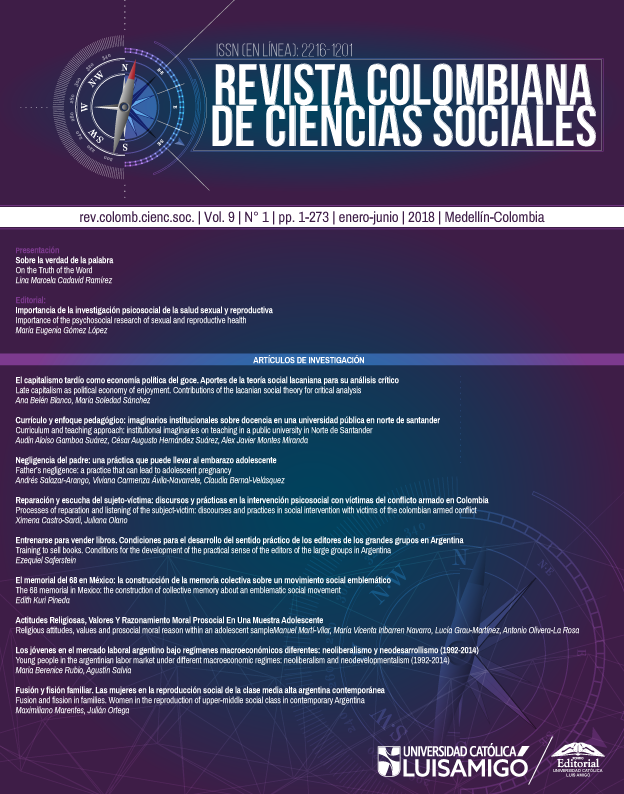Training to sell books. Conditions for the development of the practical sense of the editors of the large groups in Argentina
DOI:
https://doi.org/10.21501/22161201.2611Keywords:
Argentina, Publishers, Economic Concentration, Cultural Industry, LaborAbstract
Objective: To analyze the structural conditions in which the editors of the large companies is developed in Argentina. Methodology: The qualitative corpus is based on 40 interviews to editors and other workers of the publishing companies in Argentina. This technique was complemented with observations and secondary sources about the sector. Results: The financialization of the Latin American publishing sector introduced the need to maximize profits, in which promoted changes in the modes of production and circulation, and in the ways of doing and thinking of publishers. These changes can be seen through the impact of the incorporation of a commercial horizon in the labor dynamics. Nevertheless, these commercial demands coexist with symbolic bets that impact on the development of the job. Conclusions: This tension between economic and cultural logics allows us to say that the articulation between practices, technical tools, trajectories and inherited knowledge gives the editors an ability to "be in the world", in a space not free of contradictions, according to the current dynamics of book production.
Downloads
References
Aguilar Pérez, P., y Cruz Covarrubias, L. P. (2010). Marketing de la Industria Cultural. El sector editorial en México. En Memorias Virtual Educa 2010. Santo Domingo. Recuperado de http://hdl.handle.net/123456789/1452
Ansaldi, S. (2009). Marketing cultural: El libro de bolsillo (Carrera Ciencias de la Comunicación). Facultad de Ciencias Sociales - Universidad de Buenos Aires, Buenos Aires.
Beltrán, G., y Miguel, P. (2011). Emprendedores creativos. Reacomodamientos en trayectorias de la clase media por la vía de la inversión simbólica. En 0110 Creatividad, economía y cultura en la ciudad de Buenos Aires 2001-2010 (pp. 225-253). Buenos Aires: Aurelia Rivera.
Botto, M. (2006). La concentración y la polarización de la industria editorial. En Editores y políticas editoriales en Argentina, 1880-2000 (pp. 209-249). Buenos Aires: Fondo de Cultura Económica.
Bourdieu, P. (2000). Cosas dichas. Barcelona: Gedisa.
Bourdieu, P. (2007). El sentido práctico. Buenos: Siglo Veintiuno.
Bourdieu, P. (2009). Una revolución conservadora en la edición. En Intelectuales, política y poder (pp. 223-270). Buenos Aires: Eudeba.
Bourdieu, P. (2010). El mercado de los bienes simbólicos. En El sentido social del gusto. Elementos para una sociología de la cultura (pp. 85-152). Buenos Aires: Siglo Veintiuno.
Bourdieu, P., Passeron, J. C., y Chamboredón, J. C. (2002). El oficio del sociólogo. Presupuestos epistemológicos. Buenos Aires: Siglo Veintiuno.
Chiapello, E. (2008). Accounting at the heart of the performativity of economics. Economic Sociology–Electronic European Newsletter, 10 (1), 12-15.
Cochoy, F. (1998). Another discipline for the market economy: marketing as a performative knowledge and know-how for capitalism. En The Laws of the market. Oxford: Blackwell.
de Diego, J. L. (2006). Editores y políticas editoriales en Argentina, 1880-2000. Buenos Aires: Fondo de Cultura Económica.
de Diego, J. L. (2015). La otra cara de Jano. Una mirada crítica sobre el libro y la edición. Buenos Aires: Ampersand.
de Sagastizábal, L. de, y Quevedo, L. (Eds.). (2015). Optimistas seriales: conversaciones con editores (1. ed). Ciudad Autónoma de Buenos Aires: Eudeba.
de Sagastizábal, L. (2014). “¿Qué tipo de empresas son las editoriales? Lógica económica en una actividad cultural”. En VIII Congreso Internacional de Economía y Gestión “Econ 2014”. Buenos Aires: FCE-UBA.
Du Gay, P. (1997). Production of culture / Cultures of production. London: SAGE Publications.
Dujovne, A. (2014). Una historia del libro judío. Buenos Aires: Siglo Veintiuno.
Hesmondhalgh, D., y Baker, S. (2011). Creative labour: media work in three cultural industries. London: Routledge.
Holstein, J. A., y Gubrium, J. F. (1995). The active interview. Thousand Oaks: SAGE Publications.
Hutnik, E., y AUTOR (2014). Las transformaciones en el rol del editor y sus relaciones con las instituciones culturales. En IIo Congreso de Historia Intelectual de América Latina. La biografía colectiva en la historia intelectual latinoamericana. Buenos Aires: CeDInCI.
Isola, N. J. (2014). Algunas notas sobre la profesionalización académica de la educación. Trabajo y sociedad, 22, 123-139. Recuperado de http://www.scielo.org.ar/scielo.php?script=sci_arttext&pid=S1514-68712014000100009
Maxwell, J. A. (2013). Qualitative research design: an interactive approach (3rd ed). Thousand Oaks, Calif: SAGE Publications.
Muniz, J. de S. (2014). “Ventajas editoriales” entre continuidad y ruptura: esbozos tipológicos para un estudio comparado entre editores brasileños y argentinos. En IIo Congreso de Historia Intelectual de América Latina. La biografía colectiva en la historia intelectual latinoamericana. Buenos Aires: CeDInCI.
Negus, K. (2006). Rethinking Creative Production away from the Cultural Industries. En Media y Cultural Theory (pp. 197-208). Londres: Routledge.
Riveiro, M. B. (2014). Crítica literaria y escritores “nuevos” en Argentina. European Review of Artistic Studies, 5(3), 63-82. Recuperado de http://www.eras.utad.pt/docs/SET%20INTER%202014.pdf
Saítta, S. (2004). Modos de pensar lo social. Ensayo y sociedad en la Argentina (1930-1965). En Intelectuales y expertos. La constitución del conocimiento social en Argentina (pp. 107-145). Buenos Aires: Paidós.
Schavelzon, G. (2013). El nuevo rol del editor y el futuro del libro y la industria editorial. Bastarda, (21). Recuperado de http://www.revistasculturales.com/xrevistas/PDF/127/1671.pdf
Schiffrin, A. (2001). La edición sin editores. Las grandes corporaciones y la cultura. Santiago de Chile: Trilce.
Sorá, G. (2011). Libros para todos y modelo hispanoamericano. Políticas de la memoria, 10-11-12, 125-142.
Thompson, J. B. (2012). Merchants of culture. The publishing business in the twenty first century. New York: Plume.
Vanoli, H. (2011). Por una sociología del espacio editorial. Cuatro modelos de edición literaria en la Argentina (Tesis de Maestría). Facultad de Ciencias Sociales, Universidad de Buenos Aires, Buenos Aires.
Woll, T. (2004). Editar para ganar. Estrategias de administración editorial. México DF: Fondo de Cultura Económica.
Downloads
Additional Files
Published
How to Cite
Issue
Section
License
Copyright (c) 2018 Revista Colombiana de Ciencias Sociales

This work is licensed under a Creative Commons Attribution-NonCommercial-NoDerivatives 4.0 International License.
The magazine and the individual texts published in it are protected by copyright laws and by the terms and conditions of the Creative Commons Attribution-NonCommercial-NoDerivatives 4.0 International License.











